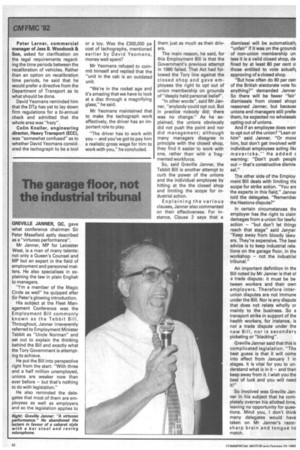The garage floor, no the industrial trtbuna
Page 28

If you've noticed an error in this article please click here to report it so we can fix it.
GREV1LLE JANNER, GC, gave what conference chairman Sir Peter Masefield aptly described as a "virtuoso performance".
Mr Janner, MP for Leicester West, is a man of many talents: not only a Queen's Counsel and MP but an expert in the field of employment and personnel matters. He also specialises in explaining the law in plain English to managers.
"I'm a member of the Magic Circle as well" he quipped after Sir Peter's glowing introduction.
His subject at the Fleet Management Conference was the Employment Bill commonly known as the Tebbit Bill, Throughout, Janner irreverently referred to Employment Minister Tebbit as "Uncle Norman" and set out to explain the thinking behind the Bill and exactly what the Tory Government is attempting to achieve.
He put the Bill into perspective right from the start: "With three and a half million unemployed, unions are weaker now than ever before — but that's nothing to do with legislation."
He also reminded the delegates that most of them are employees as well as employers and so the legislation applies to them just as much as their drivers.
The main reason, he said, for this Employment Bill is that the Government's previous attempt in 1980 failed. That Act had followed the Tory line against the closed shop and gave employees the right to opt out of union membership on grounds of "deeply held personal belief".
"In other words", said Mr Janner, "anybody could opt out. But in practice nobody did; there was no change." As he explained, the unions obviously did not push the point and nor did management; although many managers disagree in principle with the closed shop, they find it easier to work with one, rather than with a fragmented workforce.
So, said Greville Janner, the Tebbit Bill is another attempt to curb the power of the unions and the individual employee by hitting at the the closed shop and limiting the scope for industrial action.
Explaining the various clauses, Janner also commented on their effectiveness. For instance, Clause 2 says that a dismissal will be automatically "unfair" if it was on the groundh of non-union membership un. less it is a valid closed shop, de. fined by at least 80 per cent a those entitled to vote actually approving of a closed shop.
"But how often do 80 per ceni of the British electorate vote foi anything?" demanded Janner So there will be fewer "fair' dismissals from closed shops reasoned Janner, but becausE unions and managers still prefer them, he expected no wholesals opting out of unions.
And if an employee does want to opt out of the union? "Lean or him" said Janner. "Or MOVE him, but don't get involved witt individual employees acting like mavericks." He added e warning: "Don't push people out — that's constructive dismis. sal."
The other side of the Employment Bill deals with limiting the scope for strike action. "You are the experts in this field," Janner told the delegates. "Remember the Heatons dispute?"
In certain circumstances thE employer has the right to clairr damages from a union for lawful action — "but don't let things reach that stage" said Janner. "Keep away from bloody lawy. ers. They're expensive. The bes1 advice is to keep industrial relations on the garage floor, in the workshop — not the industrial tribunal."
An important definition in the Bill noted by Mr Janner is that al a trade dispute: it must be be tween workers and their own employers. Therefore interunion disputes are not immune under the Bill. Nor is any dispute that does not relate wholly or mainly to the business. So a transport strike in support of the health workers, for instance, is not a trade dispute under the new Bill, nor is secondary picketing or "blacking".
Greville Janner said that this is complicated legislation. "The best guess is that it will come into effect from January 1 in stages. It is vital for you to understand what is in it — and then keep away from it. I wish you the best of luck and you will need it So involved was Greville Janner in his subject that he completely overran his allotted time, leaving no opportunity for questions. Mind you, I don't think many delegates would have taken on Mr Janner's razorsharp brain and tongue to match.


















































































































